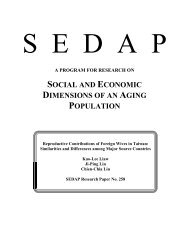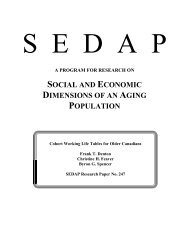Survey Results of the New Health Care Worker Study: Implications ...
Survey Results of the New Health Care Worker Study: Implications ...
Survey Results of the New Health Care Worker Study: Implications ...
- No tags were found...
Create successful ePaper yourself
Turn your PDF publications into a flip-book with our unique Google optimized e-Paper software.
386. Occupational <strong>Health</strong> as Affecting Nurses and HospitalsAs presented in Figure 1, nurses’ emotional and physical occupational health affects <strong>the</strong>ircommitment, satisfaction, absenteeism, and retention. We now turn to <strong>the</strong>se factors.Stress and burnout affect nurses’ decisions to stay with <strong>the</strong> employing hospital,absenteeism, commitment to <strong>the</strong>ir career and to <strong>the</strong>ir employing hospital, and job satisfaction. Inthis section we first examine stress and burnout constructs in detail.The changing work environment affects both mental and physical health outcomes <strong>of</strong>nurses. We examine <strong>the</strong> diagnosed health problems <strong>of</strong> nurses, with a particular focus on whe<strong>the</strong>r<strong>the</strong>y have musculoskeletal disorders.6.1. StressIn <strong>the</strong> first measure <strong>of</strong> stress, respondents were asked to describe overall how stressful<strong>the</strong>ir lives are on a 5-point scale from 1 = not at all stressful to 5 = very stressful. The samequestion was repeated about <strong>the</strong>ir jobs. For <strong>the</strong> question about life stress, 24% <strong>of</strong> respondentsrated <strong>the</strong>ir lives as stressful or very stressful. The nurses rated <strong>the</strong>ir jobs slightly more stressfulthan <strong>the</strong>ir lives. Almost one-half <strong>of</strong> <strong>the</strong> nurses (48%) rated <strong>the</strong>ir jobs as stressful or very stressful.In <strong>the</strong> second measure <strong>of</strong> stress, respondents were presented with 14 symptoms <strong>of</strong> stress.These items were based on a scale created by Denton et al. (2002). Nurses were asked (on a 5-point scale ranging from 1= none <strong>of</strong> <strong>the</strong> time to 5 = all <strong>of</strong> <strong>the</strong> time) how <strong>of</strong>ten <strong>the</strong>y felt this wayduring <strong>the</strong> past month. The symptoms <strong>of</strong> stress scale was obtained by summing <strong>the</strong> 14 stresssymptoms to form a stress scale. Stress scores ranged from 14 to 70 with higher scoresindicating higher levels <strong>of</strong> stress. The average <strong>of</strong> stress scale was 32.4 (std. dev. = 7.9), withCronbach’s alpha = .87, indicating good internal reliability <strong>of</strong> <strong>the</strong> stress scale. The mean for <strong>the</strong>symptoms <strong>of</strong> stress indicates that nurses are feeling stressed. The most frequently reported








